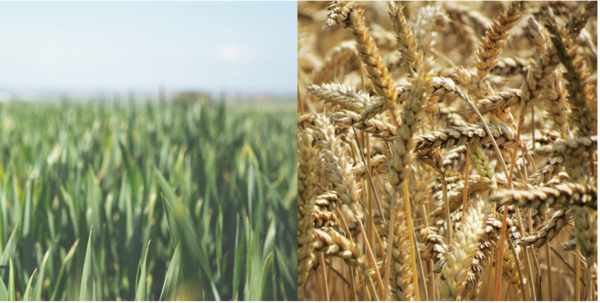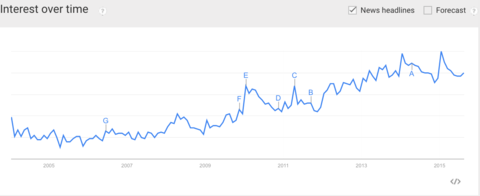- Continue Shopping
- Your Cart is Empty
What's the Difference Between Grass Fed and Grain Fed Beef?
Grass Fed Beef: Jerky Plus

What’s the Difference Between Grass Fed and Grain Fed Beef?
Headlines promote grass-fed, packaging displays it proudly, and folks everywhere say it’s great. But when it comes right down to it, what is the biggest difference between grass fed cattle and grain fed cattle? “I thought all cows eat grass?!” The trend is moving up-and-to-the-right. The graph below comes from trends.google.com and shows interest in the search term "grass fed" increasing and forecasted to continue growing.

Let's get the terminology down. The USDA describes the definition of “grass-fed” to mean the animal has exclusively eaten grass and forage (post weaning) and maintains continuous access to pasture during the growing season. Conventional beef cattle consume diets including grains and corn. According to a CNN.com study, a feedlot cow will grow to slaughter weight almost a year faster than their grass-fed-friends. “Conventional factory meat is so cheap because they’ve done everything to speed growth and lower the cost of feed” says Jo Robinson of Eatwild.com. The two diets account for different nutritional value. Let’s explore.
Omega-3:
One of the main differences in nutrition between grass-fed beef and other forms of cattle raising is the concentration of Omega-3. Grass fed beef contains higher concentrations of omega-3. According to WebMD, this is a good, nay, great thing for the healthy conscious individual. In the article “The Facts of Omega-3”, WebMD looks at correlations between baby development, levels of depression, Alzheimer’s disease and the intake in Omega-3s. The results show a diet with high amounts of Omega-3s lead to healthy baby development, lower levels of depression and protection against Alzheimers disease. “When possible, try to get omega-3 fatty acids from foods rather than supplements” says WebMD. According to the Washington Post, “Omega-3 levels in grass-fed beef generally are about 50 percent higher than in regular beef.”
Lean-Mean-#EnduranceDriven-Machine:
Grass-fed beef has less total fat than other types of beef. According to Shalene McNeill, Ph.D. in human nutrition and executive director for human nutrition research association (he might know his stuff), “if you eat a typical amount of beef per year, which in the United States is about 67 pounds, switching to grass-fed beef will save you 16,642 calories a year.” Redefining the term “lean”, grass-fed beef makes up a small percentage of total meat consumption, but those trends are increasing and projected to continue increasing as conscious consumers pay more attention to the source of their food.
Who’s Your Farmer?

Moving the needle in the grass-fed revolution (okay, revolution might be a bit hyperbolic) is the question seen on bumper stickers across the country. Who’s your farmer? The question, at its core, is asking, where does your food originate? Can you trace the ingredients back and reverse engineer the food you’re consuming? For a real challenge, choose any item in the snack aisle of your favorite convenience store. Good luck! Consuming grass-fed and grass finished cattle aligns with the “local” movement. Others refer to it as clean eating, the practice of understanding where each ingredient originates. Is it processed? Local? Fresh? Seeing a picture of the cattle ranch where your beef originated is meaningful. Want to know about Two Creek Ranch (where Omnibar cattle are raised), check out the “about us” page.
The Omnibar Mission:
Studies show grass-fed has benefits beyond knowing where your food originates. Day-to-day health obviously matters. Omnibar created a natural, healthy alternative to excessive sugar food-bars. We did this for the endurance driven athlete looking for pure fuel. We believe high-protein grass-fed beef fills a void in the athlete’s nutrition intake. You’ll find on our mission page a statement committing to using everyday foods and avoiding anything we can’t pronounce. If you have any questions or comments or are looking to join a pretty great community, give us a shout!
Leave a comment
Explore these sites
- Non Gamstop Casinos
- Casino Sites UK
- Best Non Gamstop Casinos Uk
- Nuovi Casino Online
- UK Online Casinos Not On Gamstop
- Casino Non Aams
- Casino Sites Not On Gamstop
- Meilleur Casino En Ligne
- Slots Not On Gamstop
- Non Gamstop Casinos UK
- Casinos Not On Gamstop
- Non Gamstop Casinos UK
- Non Gamstop Casino Sites UK
- Casino Non Aams
- Non Gamstop Casinos UK
- Casinos Not Signed Up To Gamstop
- Casino Sites In UK
- Meilleur Casino En Ligne Retrait Immédiat
- Meilleur Casino En Ligne
- Non Gamstop Casino Sites UK
- Casino Not On Gamstop
- Casino Sites UK Not On Gamstop
- Non Gamstop Casino UK
- UK Online Casinos Not On Gamstop
- Lista Casino Online Non Aams
- Migliori Casino Online Italia
- Casino Online
- Casino En Ligne
- App Scommesse
- Avis Sur Sweet Bonanza
- 코인카지노
- плинко играть
- Casino En Ligne
- Bonus Casino Senza Invio Documenti
- Siti Non Aams Legali In Italia
- Casino En Ligne 2026
- Casino En Ligne Argent Réel
- Migliori Casino Non Aams
- 슬롯머신





Brian Moses
Author
I work hard during the week and play hard on the weekends. Get outside. Get after it.